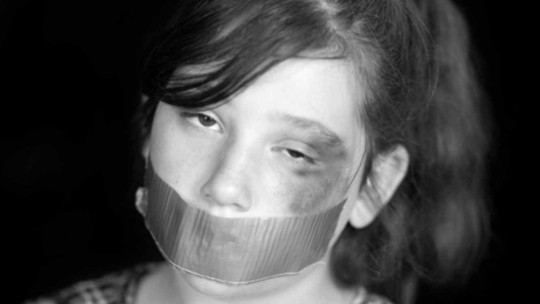Unfortunately, abuse is a phenomenon that can occur in interpersonal relationships, whether as a couple, family, or between classmates at school (bullying) or work (mobbing).
A very common form, and one that is less visible than physical abuse, is emotional abuse. In this article We will review the characteristics of a psychological abuser
Psychological abuse causes serious mental problems for the victim
And it is that Psychological abuse can be silent at times, however, it is devastating for the person who suffers it Low self-esteem can be both a cause and a consequence of this phenomenon manifesting itself, but, in addition, the person who is a victim of emotional abuse usually suffers from serious problems, such as stress, anxiety, depression and even addiction to psychoactive substances.
But, What are abusive people like? What characteristics do they have? Below you can find a list of the most common traits or habits of the abuser.
1. They are intolerant
Intolerant people do not respect the opinions, attitudes or behaviors of others. They are people full of prejudices. This causes them to react in an aggressive, resentful and impolite way , since they consider that there is no reason to prevent their own will from prevailing. They tend to be sexist.
2. They are charming at first
But these people are not intolerant at first, but They are charming in the initial phases of the relationship They know how to behave, and it may take a while for their true self to appear. As trust with the other person increases, then they show destructive behavior.
3. They are authoritarian
Abusers are authoritarian because they are characterized by having undemocratic and intransigent traits They are lovers of order, but from a subjective point of view, that is, based on their personal criteria. It doesn’t matter if they are right or wrong, because if you don’t obey them they get angry.
4. They are psychologically rigid
These individuals have rigid thinking and pursue a single truth, their own They are not people who dialogue and seek consensus, but rather they fear giving in to the opinions of others, because they believe that only they are right. Anything that does not fit their thinking is wrong, and thus they guarantee that the only existing truth is theirs.
On the other hand, these people tend to think from relatively rigid and stagnant categories, which makes it easier for them to empathize little with others, even when there are reasons for this.
5. They present dichotomous thinking
Being psychologically rigid people, For them everything is good or bad There is no middle ground. In other words, either everything is white or everything is black. This happens because, generally, abusers have grown up in families that have treated them this way.
6. They are blackmailers
This type of persons They always behave in accordance with their interests and blame, inconvenience and cause fear in the victim of blackmail They tend to make the victim feel guilty for things they haven’t even done or things they have done but that aren’t necessarily wrong.
7. They do not engage in self-criticism
As they are psychologically rigid people and believe that there is only one truth, they do not know how to accept criticism. This occurs because any criticism is perceived as an assault on their identity and their way of interpreting reality; they do not consider the possibility that it could be a constructive contribution.
The victims of their abuse pay for their lack of social skills and their feeling of failure, becoming their scapegoat. Also, of course, psychological abusers do not engage in self-criticism or at least not systematically and unless they come across an experience that forces them to make a radical change in their way of seeing things.
8. Instead, they criticize
Although these people do not engage in self-criticism, Yes, they criticize others very easily They look for the other person’s flaws and beat them emotionally with their weakness, and even invent a weakness to make the victim feel bad. It is not constructive criticism, but an action aimed at making someone feel bad to enjoy their reaction or to subdue them.
9. They change their mood in seconds
Mood changes are common in this type of people , which go from a pleasant state to anger or rage in a matter of seconds. Therefore, they can live in two extremes, from being charming to being horrible people.
10. They are easily offended
These mood changes are often due to their hypersensitivity since They tend to get offended easily It has already been said that if something does not fit your truth, then it is wrong.
11. They disconnect the victim
Isolating the victim from family and friends is one of the goals by which the abuser forces the victim into total submission. The idea is that the victim feels threatened and is afraid to talk to other people
12. They are cruel and insensitive
These types of people not only psychologically abuse their partners, but also They tend to spread this type of behavior, for example, with their children and can even cause physical harm to pets They are cruel and insensitive people.
13. They have no regrets
They are people who do not regret what they do , and as explained in the previous point, they usually have this type of behavior with other people. This is why, among other things, it is a psychological profile that should be kept away, since there is not even the possibility of them reconsidering too much.
14. They make false promises
Although they may seem regretful at times, These individuals tend to make false promises They are experts at asking for forgiveness but, in reality, they do not regret it. Their I’m going to change has no value, because at the minimum they act the same.
15. They are controlling
They are people who have the need to feel superior and control others Although they are insecure people and are afraid of being unmasked, control becomes their ally. This is the way to keep everything tightly tied up, so that nothing escapes from your hands.
16. They have no emotional control
Despite wanting to control others, they have no emotional control In fact, many are completely emotionally illiterate people. That is why they behave impulsively, without reflecting on their inner life.
17. They don’t stop
Not having a great capacity for reflection, they are people who do not stop for anything , for them the end justifies the means. They are people who can even act stealthily in public places, turning the victim’s life into a real ordeal.
18. They are seductive
Being charming people at first, they usually conquer their victim In fact, they are people who seduce easily and have a great capacity for seduction.
19. They are liars
Obviously, manipulative people are not honest people This makes them expert liars, telling one lie after another. In fact, they rarely tell the truth, because they are always looking to hurt the other person.
20. They play the victim
Since they are always blaming the other person, They often adopt the role of victim to justify their actions For example, saying phrases like “you don’t love me, because you are always more aware of your friends.” The actions of psychological damage are continuous, but do not necessarily have to be direct. Some come masked with false victimhood.
21. Low empathy
Abusive people are not empathetic What does this mean? Well, they do not recognize the emotions of others or connect with them. This allows them to make the victim suffer without having any type of resentment.









